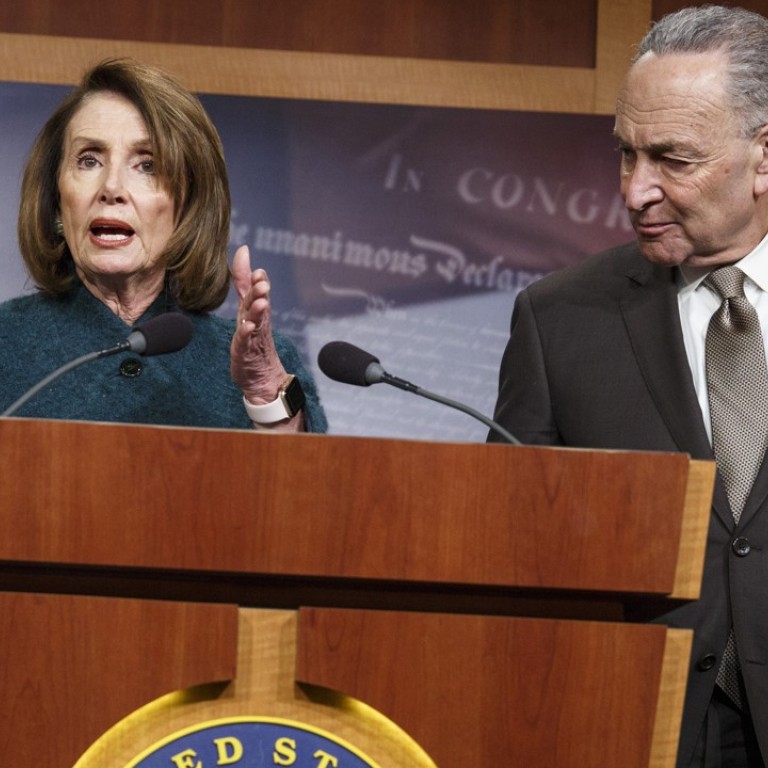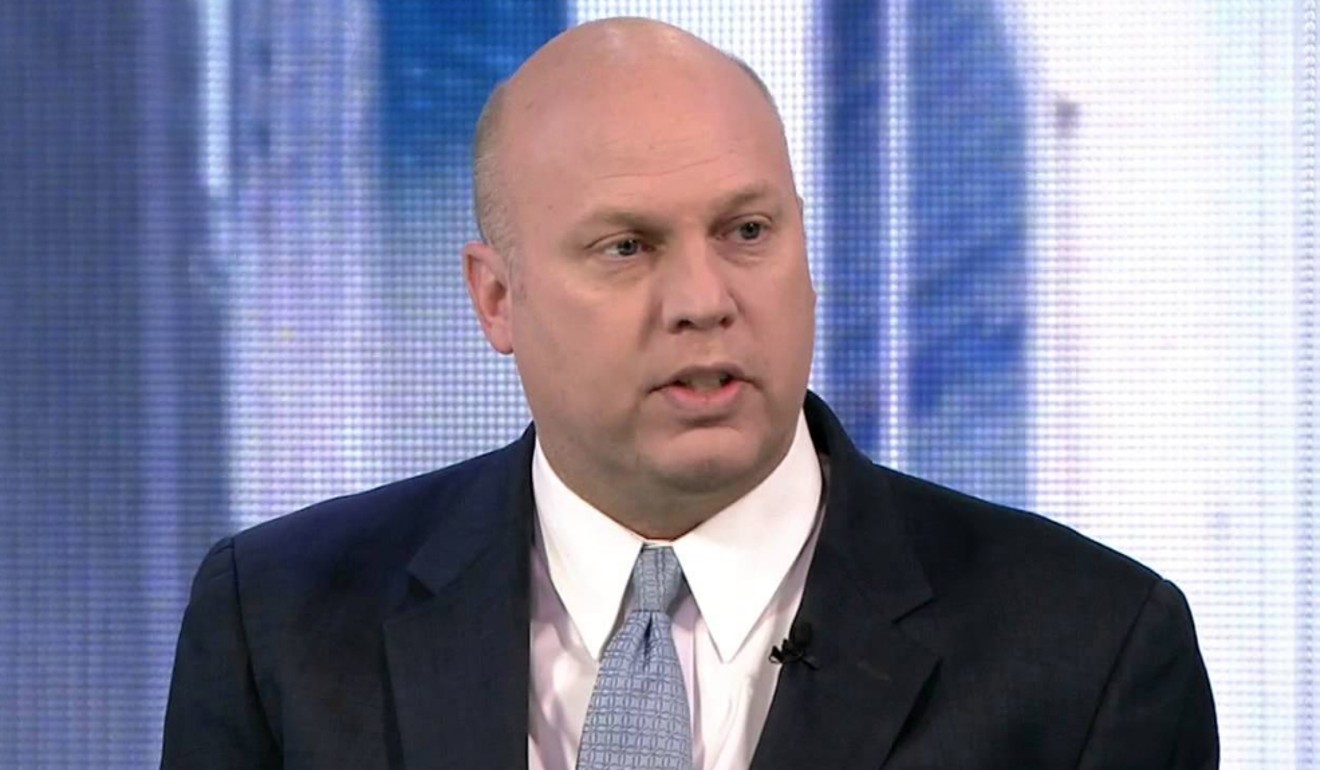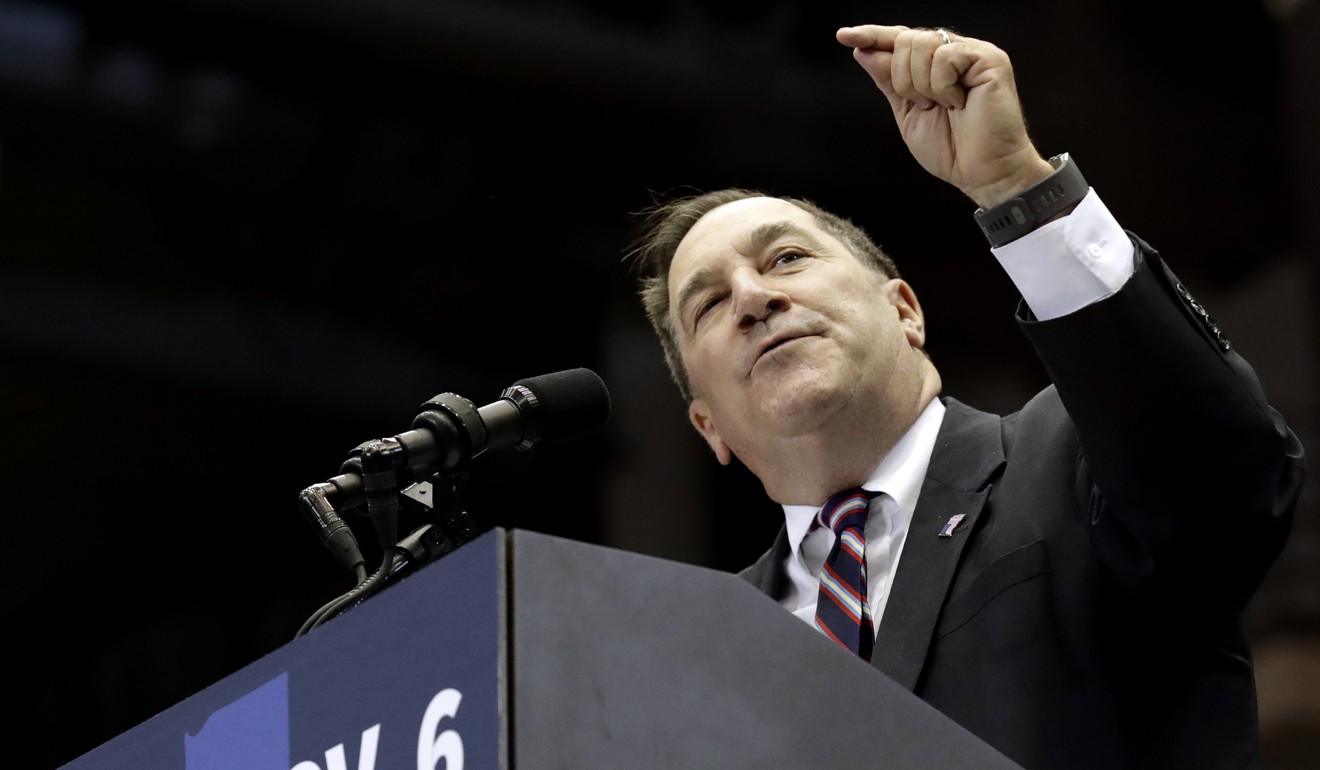
Beyond the midterms: after the smoke clears, China hawks will remain the rule in Washington
- If Democrats regain control of Congress, many Trump policies might come under fire. A tough stance on Beijing won’t be one of them, analysts say
Many of US President Donald Trump's controversial policies could face more formidable resistance after the country’s midterm elections on Tuesday – which pollsters say could result in a strong comeback by the Democratic Party – but his tough stance against China will likely remain intact.
Since the two largest economies started to apply punitive tariffs on each other’s exports in July, some scholars in China have speculated that Trump – confronted by a “blue wave” coming out of the November elections, which the president called “a referendum about me” – would end up ensnared more tightly in partisan politics and see his China policies challenged, too.
But while the two parties are highly split over immigration, medical care, fiscal and economic issues, their divide on China policies is much narrower, according to former US officials and analysts.
“Both sides are waiting for the midterms, but it's not going to change the trajectory of the relations,” said Christopher Johnson, the Freeman Chair in China Studies at the Centre for Strategic and International Studies.
“I hear from too many Chinese that things will change after the midterms. That's probably misinformed.”
The US midterm elections take place on Tuesday, with all 435 seats in the House of Representatives and 35 of the 100 seats in the Senate up for contesting.
Polls suggest that the Democrats are likely to retake control of the House, though probably not the Senate. In an interview a week ago, Representative Nancy Pelosi, the San Francisco Democrat who is the House minority leader, said that the Democrats would win “if the election was held today”.
Wishful thinking is high among some Chinese scholars that a “blue wave” in the midterms – a surge in Democratic victories – would compromise Trump's tough stance on China.
A commentary published in the Chinese Communist Party mouthpiece People's Daily in August raised the notion that Republicans supportive of free trade – presumably like Charles Koch, a billionaire industrialist – could work with the Democrats after the midterms to push back against Trump's tariffs.
Even though the House has only limited influence over foreign policy, Trump welcomed that narrative, using it in September to support his contention that China wanted the Republican Party to lose in the midterms.
Washington and Beijing are engaged in a tit-for-tat trade war, slapping punitive tariffs of up to 25 per cent on each other’s goods, with Trump threatening further measures. The Chinese economy has already started to show signs of strain and the country’s industrial association has asked businesses for feedback on the impact of the tariffs.
But signs are few that Democrats would push for a softer approach on China. Some influential Democrats have from the outset of Trump’s trade war supported the tariffs on China exports, and have even stood behind Trump’s confrontational approach on a broader range of issues with China.
In March, after the White House announced its plan to proceed with a trade war, Pelosi urged the Trump administration in March to “do much more to fight for American workers and products”.
The tariffs were also applauded by Senate Democrats Sherrod Brown of Ohio, who said a more “comprehensive and long-term strategy” is needed for trade with China, and Charles Schumer of New York, the Senate's minority leader.
Even Senator Elizabeth Warren, a Massachusetts Democrat who is a notable Trump foe, criticised China's trade practices and treatment of human rights during a visit she made to Beijing in March.
China has become an election issue for the first time in decades, and will remain so until 2020, said Derek Scissors, an economist with the American Enterprise Institute, a conservative think tank in Washington that has grown highly influential in the past two years.
“China is now a US presidential election issue,” said Scissors. “It's about what's going to win the crucial votes in the industrial states in the next election.”
“Democratic Party candidates for president are thinking about how to take China votes away from Trump,” he said, adding that they are generally more anti-trade than Republicans.

Ryan Hass, who directed China policy for the National Security Council during the Obama administration, agreed that the bilateral ties have escalated into a political issue under Trump.
“The areas of the country that President Trump cares most about to win the presidency were areas that have felt the effects of global trade, and they are sensitive to China,” said Hass, now a foreign policy fellow at the Brookings Institution.
There will be political pressure for presidential candidates to remain tough on China
Bringing China into political debates was something Obama had tried to avoid, he added.
“He didn't want to make China a big political issue. It was too important an issue for the future of the United States to be overly politicised,” said Hass.
Trump has reversed the practice, and China will remain political at least through the run-up to the 2020 election, he said.
“There will be political pressure for presidential candidates to remain tough on China,” Hass said. “It's a mistake to view what's happening as just a Trump phenomenon that will just go away with his time in office.”
Bipartisan support was seen in a bill introduced in September to impose a crippling ban on the Chinese telecommunications giant ZTE Corp should it violate a deal it struck with the Trump administration after being found to have sold equipment to North Korea and Iran in defiance of sanctions.
An expansion of the inter-agency Committee on Foreign Investment in the US’s power to review mergers and acquisitions by foreign buyers also drew support across the aisle.
Even some Midwest Democrats worried about the trade war's impact on the US economy talk tough on China. Senator Debbie Stabenow of Michigan, who is seeking re-election on Tuesday, last week called China's trade practices “the biggest concern to us”, before saying that the tariffs also inflicted economic hardships on Americans.
Joe Donnelly, a Democratic senator from Indiana also seeking re-election, raised questions about the tariffs in July – but only after agreeing with Trump that the US had to “crack down on bad actors, including China”.

The anti-China sentiment has been fuelled in part by Trump's rhetoric against the Obama administration, said Johnson, the China specialist with CSIS and a former intelligence liaison to then-Secretary of State Hillary Clinton.
Recalling the China policies of previous administrations, he said that he and some other former officials shared “a sense ... that they sort of fell asleep at the switch”.
As a result, he said, some Democrats felt they had to become publicly hawkish on US-China dealings.
“There are many Democrats now in foreign policy, national security and economics who have become concerned that their reputation has become that of a schlub or a chump.”
“So the only way to respond to that is to double down and look a little fiercer,” Johnson added. “When you interact with these individuals, they sound a lot more like they are the Trump administration doppelgängers.”
Trump has repeatedly assailed the China policies of previous administrations, especially Obama's. In a story the president frequently tells, Washington did nothing when China slapped 25 per cent tariffs on US automobiles during the Obama administration – even though, Trump says an unnamed Chinese senior official told him, Beijing was expecting serious reprisals from Washington.
Last month, Trump slammed Obama for an “impotent” policy in the dispute over the South China Sea, almost all of which is claimed by Beijing as its territory.
Johnson said that Trump's accusations about the Obama administration were not fair. But Johnson acknowledged that he had felt frustrated under previous administrations when Washington failed to meet “the minimum expectations” of how it should behave.
“Take, for example, 2012, Scarborough Shoal. They fully expected we would attempt to dislodge them from there, or at least push back very sternly,” he said. “We did not. There were no consequences.”
China in early 2012 seized control of the Scarborough Shoal, an outcropping in the South China Sea claimed by both Beijing and Manila, and deployed navy and coastguard vessels to prevent Philippine fishermen from working in the rich fishing grounds nearby. Chinese coastguard vessels only left in 2016, after a thaw of relations with Manila.
Hass rejected the view that the Obama administration lacked a strategy to compel China to change its behaviour.
“There are things if we had a chance to do it again we could have done differently. We didn't do everything perfectly,” he conceded. “People seem to suggest the previous administrations just tried to meet behind close doors, talk nicely to China and ask them kindly. That's inaccurate.”
He said that Obama's approach to China included: direct engagement with Beijing; filing a record number of cases against China with the World Trade Organisation; and assembling the Trans Pacific Partnership (TPP) and the Transatlantic Trade and Investment Partnership (TTIP), which brought together nations representing 65 per cent of the global economy to compel China to raise its trade standards.
Trump has since backed out of the TPP.

Trump has also accused China of interfering with these midterm elections, while providing little evidence beyond a September China Daily advertising supplement in Iowa’s largest newspaper, the Des Moines Register, that highlighted the impact on the state’s soybean farmers as “the fruit of a president’s folly.’’
As Senate Democrats in October pressed Trump for evidence of his claim of China’s interference, the two parties further split over Trump's accusation that likened Beijing to Moscow, which the intelligence community has consistently said interfered with the 2016 election.
Even so, concern about China's purported influence and soft-power campaign is not merely partisan.
Laura Rosenberger, formerly chief of staff to Tony Blinken, a deputy Secretary of State under Obama, said that China's influence campaign – just like Russia's interference with the 2016 election – should be considered a national security issue.
“It's really important that these threats to democracy from authoritarian interference tactics be understood by the national security community as a national security threat,” she said. “It isn't just about values – it is about values, but also very definitely about national security.”
Rosenberger, who also coordinated national security policies for Hillary Clinton's 2016 campaign, said that the US government is still not set up correctly to address the issue of electoral interference by a foreign nation – be it Russia, China or any other country.
“I just continue to be struck by the way that many of these issues fall in the seams of our government bureaucracy,” she said. “We are not structured right to understand or counter these threats. We really need to do some serious thinking internally about how to better position ourselves.”

